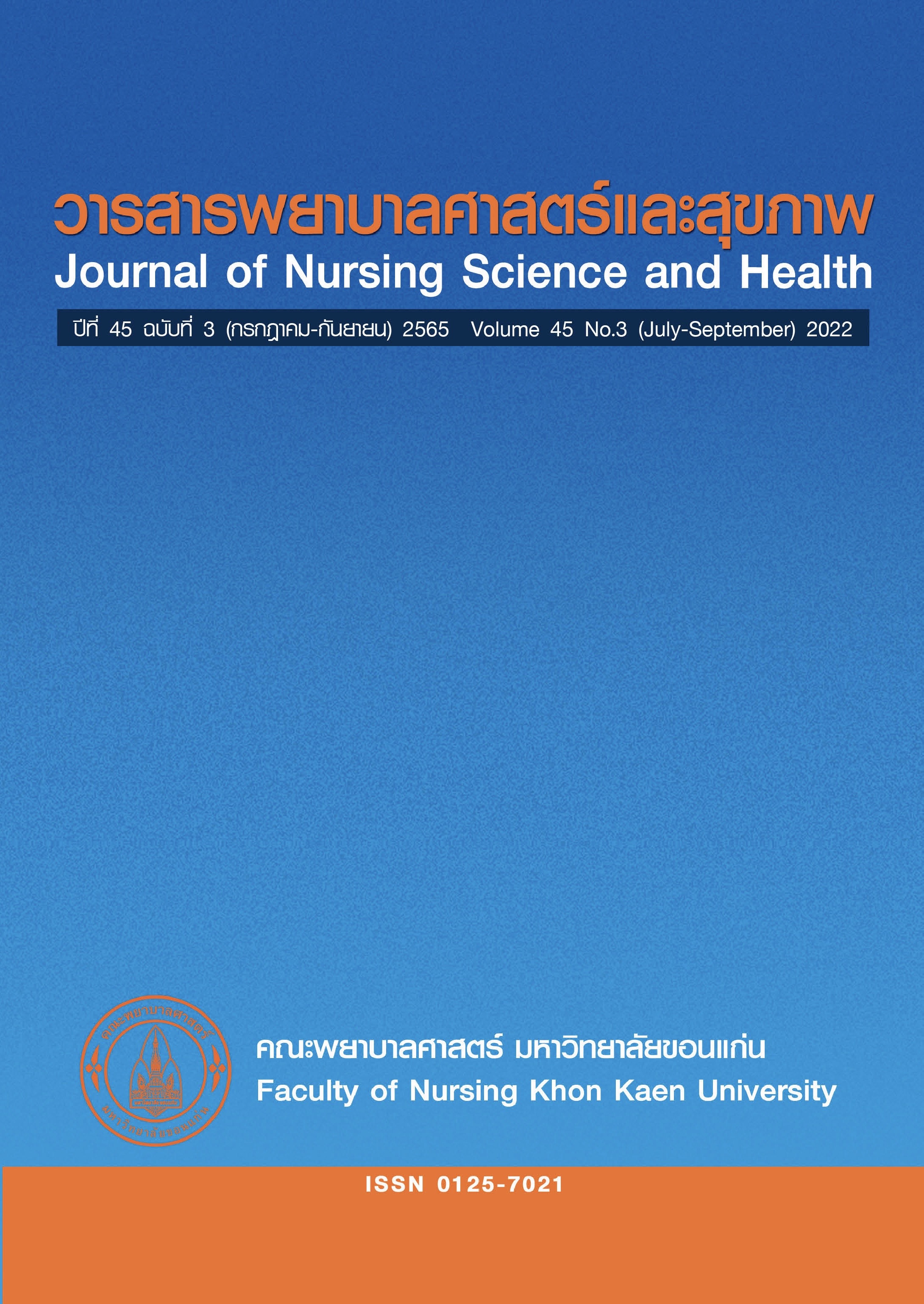ผลการเรียนรู้และความคิดเห็นของนักศึกษา ชั้นปีที่ 4 ต่อวิชาปฏิบัติการพยาบาลรวบยอด: การศึกษาในหลักสูตรพยาบาลศาสตรบัณฑิต มหาวิทยาลัยขอนแก่น
คำสำคัญ:
วิชาปฏิบัติการพยาบาลรวบยอด , ผลลัพธ์การเรียนรู้ , นักศึกษาพยาบาล , การจัดการเรียนการสอนบทคัดย่อ
การวิจัยเชิงพรรณนาครั้งนี้ มีวัตถุประสงค์เพื่อศึกษาผลการเรียนรู้ตามการรับรู้และความคิดเห็นของนักศึกษาพยาบาลศาสตรบัณฑิต ชั้นปีที่ 4 คณะพยาบาลศาสตร์ มหาวิทยาลัยขอนแก่น ภายหลังสิ้นสุดการเรียนการสอนรายวิชาปฏิบัติการพยาบาลรวบยอด ประชากรที่ศึกษาคือ นักศึกษาพยาบาลศาสตรบัณฑิต ชั้นปีที่ 4 จำนวน 214 คน ที่ฝึกปฏิบัติวิชาปฏิบัติการพยาบาลรวบยอด ในภาคการศึกษาปลาย ปีการศึกษา 2564 ดำเนินการเก็บข้อมูลในเดือนเมษายน-พฤษภาคม 2565 ซึ่งในการวิจัยครั้งนี้เก็บรวบรวมข้อมูลได้จำนวน 173 คน คิดเป็นร้อยละ 80.84 ของกลุ่มประชากรเป้าหมายทั้งหมด เครื่องมือที่ใช้ในการเก็บรวบรวมข้อมูล ประกอบด้วย แบบสอบถามผลการเรียนรู้ตามการรับรู้ของนักศึกษาพยาบาลศาสตรบัณฑิต ชั้นปีที่ 4 และแบบประเมินความคิดเห็นต่อการจัดการเรียนการสอนในรายวิชาปฏิบัติการพยาบาลรวบยอด ซึ่งได้ผ่านการตรวจสอบความตรงเชิงเนื้อหาจากผู้ทรงคุณวุฒิ 3 ท่าน และผ่านการตรวจสอบความเชื่อมั่นโดยใช้สูตรสัมประสิทธิ์แอลฟาของครอนบาค เท่ากับ 0.968 วิเคราะห์ข้อมูลด้วยสถิติเชิงพรรณนา
ผลการวิจัย พบว่า 1) ภายหลังสิ้นสุดการเรียนการสอนรายวิชาปฏิบัติการพยาบาลรวบยอด นักศึกษาพยาบาลศาสตรบัณฑิต ชั้นปีที่ 4 มีผลการเรียนรู้โดยรวมอยู่ในระดับมาก (=4.28, S.D.=0.41) เมื่อพิจารณาเป็นรายด้าน พบว่ามีด้านที่อยู่ในระดับมากที่สุด 2 ด้าน คือ ด้านคุณธรรม จริยธรรม (=4.59, S.D.=0.47) และด้านทักษะการปฏิบัติทางวิชาชีพ (=4.58, S.D.=0.57) และอยู่ในระดับมาก 4 ด้านคือ ความสัมพันธ์ระหว่างบุคคลและความรับผิดชอบ (=4.31, S.D.=0.49) ด้านทักษะทางปัญญา (=4.14, S.D.=0.47) ด้านทักษะการวิเคราะห์เชิงตัวเลข การสื่อสารและการใช้เทคโนโลยีสารสนเทศ (=4.04, S.D.=0.50) และด้านความรู้ (=4.00, S.D.=0.49) 2) นักศึกษามีความคิดเห็นว่าการฝึกปฏิบัติการพยาบาลในรายวิชาปฏิบัติการพยาบาลรวบยอด เป็นการสร้างประสบการณ์วิชาชีพเพิ่มเติม นอกเหนือจากการเรียนในห้องเรียน และสามารถนำความรู้จากทฤษฎีไปประยุกต์ใช้ในการปฏิบัติงาน ทำให้เกิดความมั่นใจในการปฏิบัติงานจริง ซึ่งผลการศึกษาครั้งนี้สามารถนำไปเป็นข้อมูลพื้นฐานสำหรับอาจารย์พยาบาลในการจัดการเรียนการสอนในภาคปฏิบัติที่มีประสิทธิภาพมากยิ่งขึ้น เพื่อช่วยให้นักศึกษาสามารถก้าวผ่านประสบการณ์ชีวิตในการฝึกปฏิบัติงานได้เป็นอย่างดี
เอกสารอ้างอิง
Rafiee G, Moattari M, Nikbakht AN, Kojuri J, Mousavinasab M. Problems and challenges of nursing students’ clinical evaluation: A qualitative study. Iranian Journal of Nursing and Midwifery Research 2014;19(1):41–9.
Faculty of Nursing Khon Kaen University. Educational philosophy [Internet]. 2019 [cited 2022 Jan 10]. Available from: https://nu.kku.ac.th/thai/index.php/2017-06-21-10-34- 01/2017-10-05-14-52-36.
Thailand Nursing and Midwifery Council. National Higher Education Development Plan [Internet]. 2019 [cited 2022 Jan 30]. Available from: https://www.tnmc.or.th/images/ userfiles/files/normal2563(1).PDF
Ministry of Education. Developing effective learning outcomes and assessment for programmes. [Internet]. 2017 [cited 2022 Jan 31]. Available from: https://www.ubu.ac.th /web/files_up/46f2018081509524869.pdf
Kooariyakul A. Clinical learning assessment of nursing students. Journal of Boromarajonani College of Nursing 2017;33(2):179-87. (in Thai)
Mokekhaow K, Sukrapat W, Promla W. Factors related to stress of nursing students. Journal of Nursing Science & Health 2021;44(2):60-71. (in Thai)
Shokebumroong K, Wonggom P, Suwittawa C. Self-perceived nursing competencies of the second-year nursing students in adult health nursing practice course I at the Faculty of Nursing, Khon Kaen University. Journal of Nursing Science & Health 2021;44(2):72-85. (in Thai)
Singhatanadgid W, Sombatkaew N. Evaluations of teaching-learning strategies in the practicum of the fundamental of nursing course, The Thai Red Cross College of Nursing. Thai Red Cross Nursing Journal 2019;12(1):177-93. (in Thai)
Srisaat B. Preliminary research. 8th edition, Bangkok: Suwiriyasan;2010.
Chaemchaeng S, Atthamethakul W, Phithaksin D. The effect of readiness preparation for nursing practice in ward of 2nd year nursing students, Borommarajonnani college of Nursing, Ratchaburi. Journal of Science & Technology 2018;20(3):147-63. (in Thai)
Faculty of Nursing Khon Kaen University. Guide for collective nursing practice courses for students of the bachelor of nursing program in the 4th year of the final semester. Khon Kaen: Faculty of Nursing Khon Kaen University;2021.
Janton S, Bunlikitkul T. Readiness to practice in the fundamentals of nursing practicum among nursing students at The Thai Red Cross College of Nursing. Thai Red Cross Nursing Journal 2012;5(1):32-45. (in Thai)
Intaranongpai S, Kotchakot J. The learning outcome under the qualifications framework for higher education (TQF) in community nursing practicum subject, Bachelor of nursing science. JOPN 2017; 9(2):104-14. (in Thai)
Svastdi-Xuto P, Wangsukpisan A. Transition Experiences of Nursing Students’ Clinical Initial Practice. Journal of Faculty of Nursing Burapha University 2019;27(3):32-42. (in Thai)
ดาวน์โหลด
เผยแพร่แล้ว
รูปแบบการอ้างอิง
ฉบับ
ประเภทบทความ
สัญญาอนุญาต
ลิขสิทธิ์ (c) 2022 วารสารพยาบาลศาสตร์และสุขภาพ

อนุญาตภายใต้เงื่อนไข Creative Commons Attribution-NonCommercial-NoDerivatives 4.0 International License.
วารสารพยาบาลศาสตร์และสุขภาพเป็นเจ้าของลิขสิทธิ์ในการเผยแพร่ผลงานที่ตีพิมพ์ห้ามผู้ใดนำบทความที่ได้รับการตีพิมพ์ในวารสารพยาบาลศาสตร์และสุขภาพไปเผยแพร่ในลักษณะต่าง ๆ ดังนี้ การนำบทความไปเผยแพร่ออนไลน์ การถ่ายเอกสารบทความเพื่อกิจกรรมที่ไม่ใช่การเรียนการสอน การส่งบทความไปตีพิมพ์เผยแพร่ที่อื่น ยกเว้นเสียแต่ได้รับอนุญาตจากวารสารพยาบาลศาสตร์และสุขภาพ



